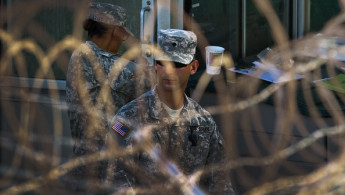US subjects Guantanamo detainees to 'cruel and degrading' treatment, according to first UN visitor to camp
The first independent UN investigator to visit the detention centre at Guantanamo Bay said on Monday that the US government subjects the 30 inmates held there to “ongoing cruel, inhuman and degrading treatment under international law.”
UN Special Rapporteur Fionnuala Ní Aoláin, an Irish law professor, had been granted unprecedented access to Guantanamo, spending four days there in February. During her stay, she was allowed to meet a number of the 30 remaining prisoners at the camp.
Ní Aoláin was allowed access to both Camp 5, which houses the “high-value” prisoners, including 5 men accused of plotting the 9/11 attacks, and Camp 6, which houses “non-high value” detainees.
The notorious Guantanamo detention facility opened in 2002 under then US President George W. Bush to house detainees captured during the Bush administration's "Global War on Terror", which was the US response to the September 11 attacks.
In the 23-page report of her visit, Ní Aoláin praised the Biden administration for allowing the UN to inspect Guantanamo for the first time.
But she concluded that “after two decades of custody” the suffering of the detainees is “profound and ongoing".
Ní Aoláin said that the US had continued to fail to face up to the “illegal” torture and rendition programme it unleashed in the wake of 9/11.
Speaking at the press conference for her report on Monday, Ní Aoláin said that every detainee she met “lives with the unrelenting harms that follow from systematic practices of rendition, torture and arbitrary detention.”
Though Ní Aoláin found that basic living conditions in the camp had in many regards been brought up to international standards, detainees were still “vulnerable to human rights abuses”.
These include the near constant surveillance of the detainees and them being excessive restrained when travelling to meet lawyers.
Today is International Day in support of Victims of Torture. Toffiq is a torture victim and he’s been wrongly imprisoned at Guantánamo without charge or trial. He has been cleared for release for more than 13 years.
— Amnesty International USA (@amnestyusa) June 26, 2023
It's time to close Guantánamo >>> https://t.co/t34dhzBwBb pic.twitter.com/T5DGrTiZzy
Ní Aoláin met with the families of victims and survivors of 9/11 and called the attacks a “crime against humanity”.
Perhaps Ní Aoláin’s most scathing criticism of the US was that it had essentially abandoned due process and legal norms when it came to the Guantanamo prisoners. She expressed “profound concern” that 19 of the 30 detainees have never been charged with a crime, despite some having spent over two decades at the camp.
The problem, according to Ní Aoláin, is that the US refuses to admit the realities of the CIA torture programme that the Bush administration used as part of its Global War on Terror strategy.
Ní Aoláin found that the continued detention without trial of some of the detainees was due to the “unwillingness of the authorities to face the consequences of the torture and other ill-treatment” that some detainees have faced, as opposed to “the threat they are believed to pose”.
Ní Aoláin also found that the detainees who had been tortured faced extreme psychological and physical trauma that was not being adequately treated or addressed at Guantanamo.
She called on the US to apologise for its use of torture and other illegal practices and make a guarantee that it won’t happen again.
After the release of her reports, human rights groups were as equally as scathing of US conduct at Guantanamo Bay, with Amnesty International calling for US President Joe Biden to immediately close the facility and "end the unlawful practice of indefinite detention without charge or trial."
The US Ambassador to the Human Rights Council, Michele Taylor, responded to Ní Aoláin’s report by claiming the “conditions of confinement” at Guantanamo are “humane” and reflect the US’ “respect for and protection of human rights for all who are within our custody”.




 Follow the Middle East's top stories in English at The New Arab on Google News
Follow the Middle East's top stories in English at The New Arab on Google News

![A group of Palestinians, foreign and Israeli activists gather to participated in an olive picking event on the land in the town of Battir, which is under threat of confiscation by Israel in Bethlehem, occupied West Bank on 8 November 2024. [Getty]](/sites/default/files/styles/image_330x185/public/2182930803.jpeg?h=199d8c1f&itok=__0LgGsa)
